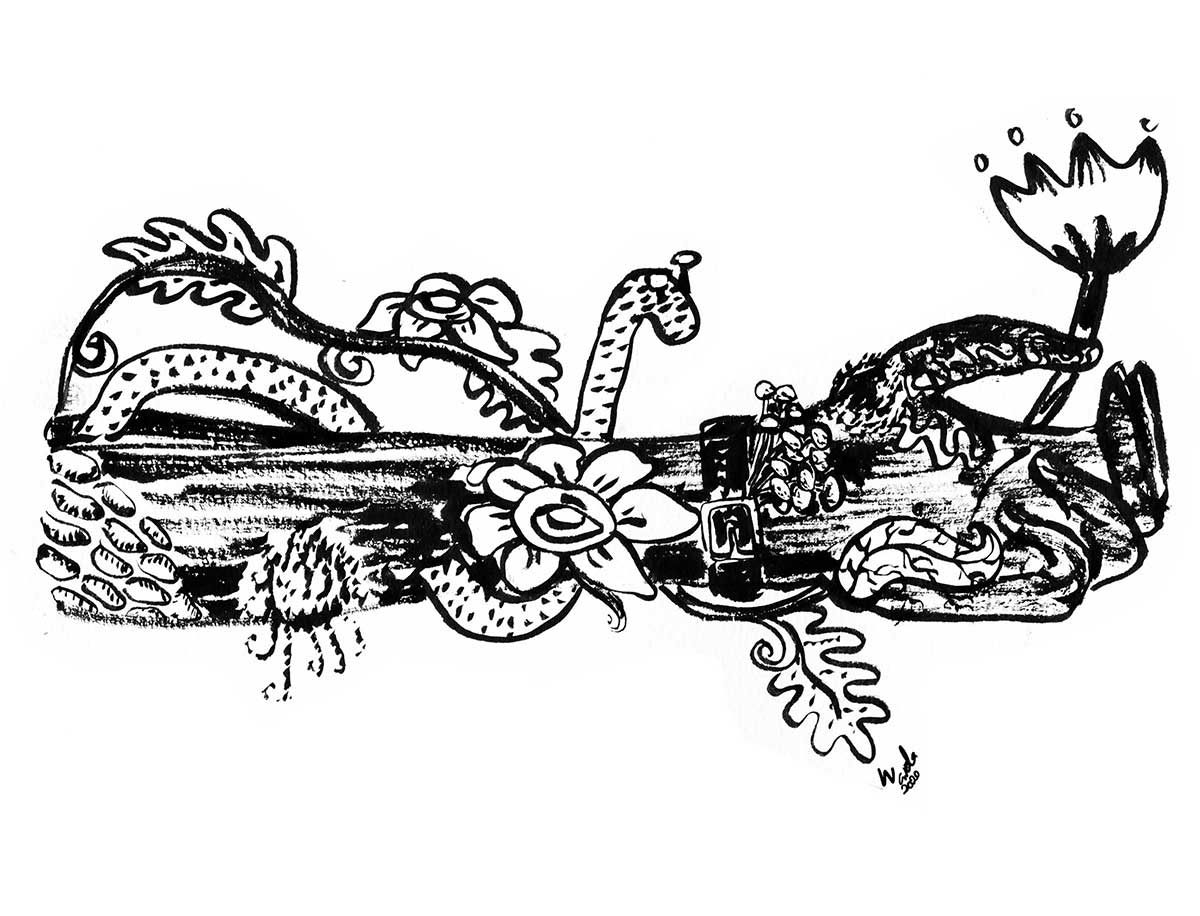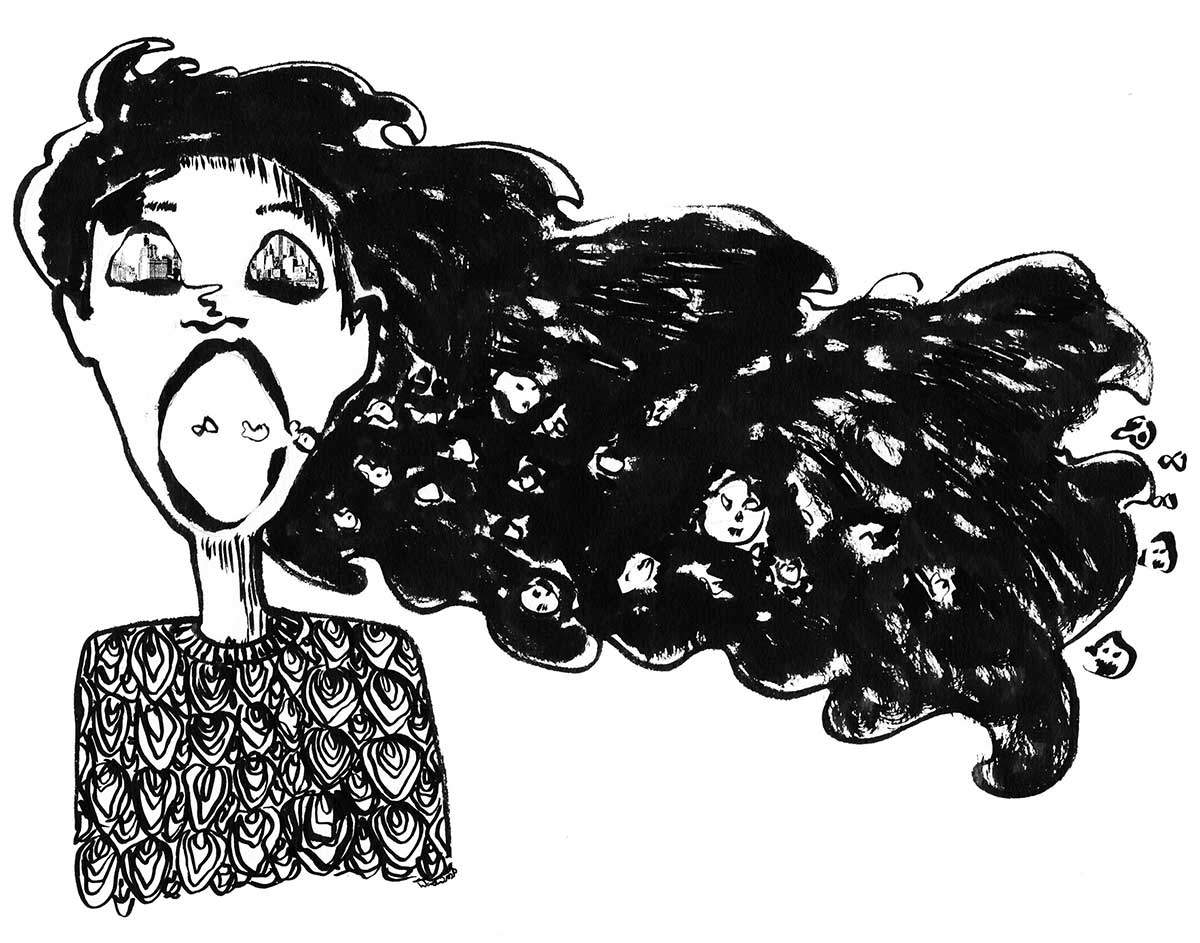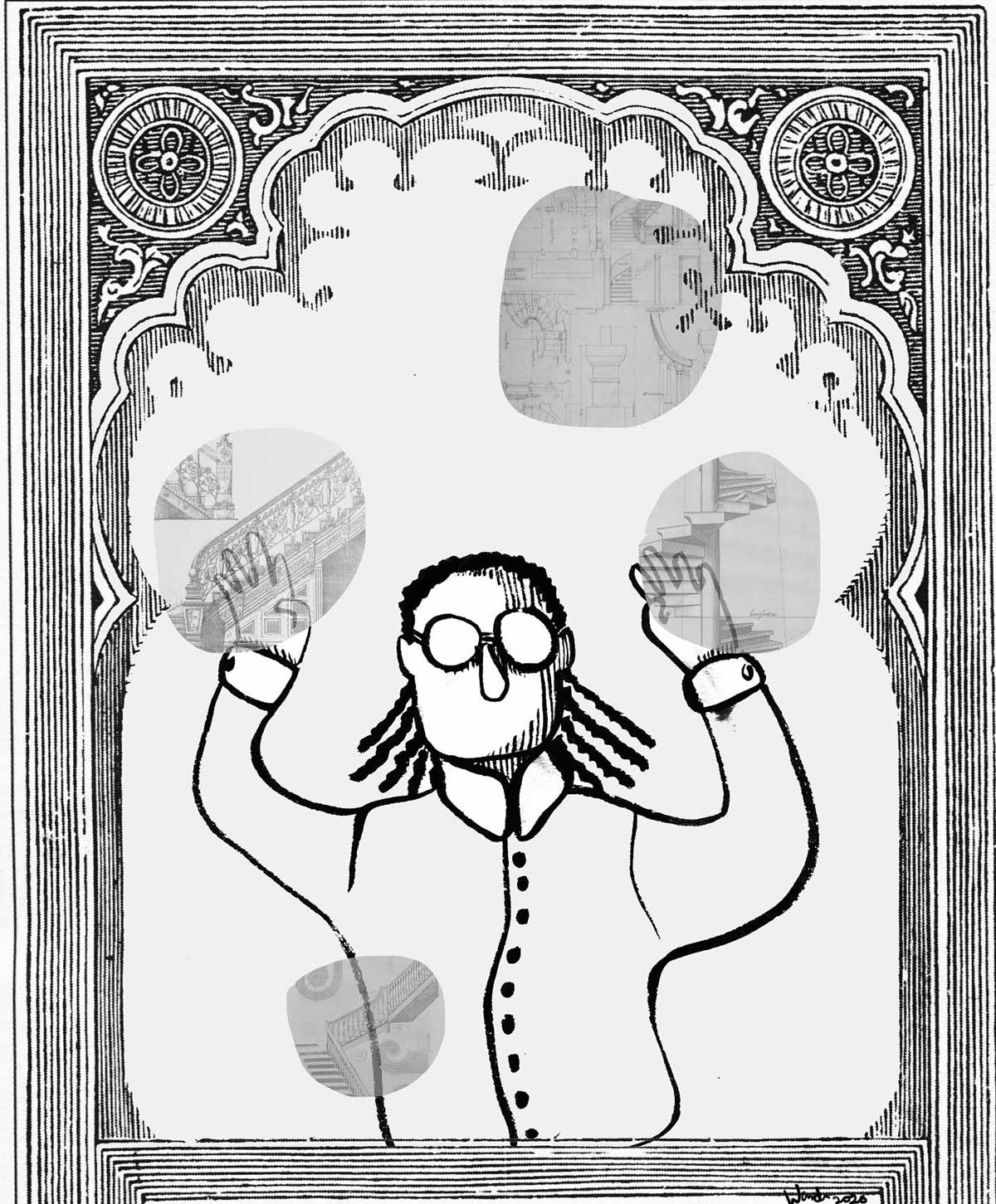Program
All times are in EET (Helsinki)

9.12.2020 — PARASITIC
Exercise in Entering and Inhabitation Practice
Karolina Kucia & H m Ouramo Zoom → DetailsAre you IN? It guides through the story of parasites, through the story of how parasites have been seen as inhabitants. It guides through space itself, allowing to find a place to leech on, to rest before the next necessity to move on.
What if we imagine that in knowledge production, there are no communal meals? What if, with the flow of nutrition, there is not a common that is produced but an undeniable power structure of one-directional growth on one side and decrease on the other? As not only one meal is served, many of those one-directional flows, where one chews on another, become a complex system - the network of a network, relations to relations itself, the system of relations, the labour structure and body/mind of the labourer. Becoming self after self, myself, yourself, ourselves, and themselves is a life-long assignment and constitutes the production of collective responsibility that, potentially, results in exhaustion and inadequateness (Ehrenberg 2010). Or, might we conceive a cultural omnivore self, engaged in forming an aggregate, propertizing time, accruing knowledge, mobility and multicultural otherness to refashion and re-tool itself (Skeggs 2004: 144), producing a monstrosity of some kind, that has no idea who speaks while stating I.
The one who makes the sound? The one who casts the content? Or the one who is produced as the result of that relation? What is the act and medium of receiving and what is an act and medium of expansion? Or who?
Keynote: Rest/Unrest: Notes on Loitering
Shubhangi Singh Stream → DetailsThe streets hold the possibility of being a hegemonic site where power is exerted, expressed, and challenged. It is a complex yet uncontained petri dish where anonymity meets identity; thus making it a fertile ground of study. Rest/Unrest: Notes on Loitering is a lecture-performance viewing public and social spaces as contact zones which further replicate and proliferate these existing patterns into everyday work, safety and leisure.
Drawing from ongoing feminist actions (essentially in Indian and Pakistan) organised by women’s collectives who through the path of inaction attempt to activate spaces that are often denied to them. By the reclamation of public spaces through the act of simply being present and visible, the session proposes loitering or hanging about while supposedly doing nothing, as a singular tool of resistance for collectives as well as for individuals.
Within the canon of dissent, non-work and personal autonomy, this session hopes to reimagine how we have come to view loitering and seeks to reframe its position within our everyday social interactions.
Break
Keynote: The Promises of the Present
Bini Adamczak Zoom → DetailsIn recent years, the ugliest undead of the past have reentered the stage of history. Nationalist, fascist and neo-Nazi movements, which many thought dead and buried, are now returning. Their ideologies, organizational structures and propaganda methods have been described many times before. But why are they returning now? What are the cracks in the conditions of the present from which they crawl out? Why are they attractive, what promise do they make? And how can we get rid not only of them also but of the conditions that enable them?

10.12.2020 — MONSTROUS
Somatik Fucktions
H m Ouramo Stream → www.hm-our.com → DetailsI am sharing a practice that I have found while trying to understand situations of disconnect and dissociation, invisibility and care. I use it in everyday situations as a way to gather knowledge and perhaps share it, to make a trace of information that is shared with me. I also use it as a score in order to generate work. I sometimes do it in relation to listening to an experience that is not my own – while someone tells me something, officially or unofficially, from another time and space, while overhearing something or while reading, in order to understand how power works on me and has worked on others. I do it in relation to my own body in order to understand the present moment and the grounds on which I build an idea of knowledge.
This practice has come together from the diagrams of somatic fictions by Paul B. Preciado and from the writings of Susan Stryker, from writings and experiences of dysphoria and from atypical migraine.
Keynote: Can Monsters Be Good?
Torkild Thanem Zoom → DetailsThis may be a particularly bad moment in history to try and redeem the idea of good monsters. It is not as if there is a shortage of bad or evil monsters in the world. While the health and lives of hundreds of millions of people world-wide are being harmed or even ended by the current corona pandemic, fascist leaders, terrorists and greedy governments and businesses across western and non-western countries continue to abuse power in ways that destroy our freedoms, livelihoods and the basis of life on earth. But despite this depressing state of affairs, that is exactly what I aim to do in this talk. While I am no longer convinced that it makes sense to positively intervene in the monstrous, I will attempt another experiment. Like all experiments this one poses a hypothesis: What if no evil monster can be fought without good monsters?
Break
Lecture-performance: Something Cold That is Bigger Than Your Hand
Dasha Che Stream → DetailsThis thinking is not about any specific politics, even though it might seem this way. It is not exactly about the monstrous economic structures that keep the circuits of migration in place and run bodies through. It is not about the things or bodies that are left behind and the longing that slowly emerges early in the morning. It is not about the mundane encounters that happen through exchange of breath and something cold that is bigger than your hand. It is not about the value of what is left behind and what is encountered. It is also not about nostalgia because nostalgia is an embarrassing thing and gets stuck in the place behind sternum and the 6th rib on the right. It is about all those things.
Some bodies continue their migration while the weak monstrous presence spread from their back to their chest. The bodies are shortening and collapsing in their thinking to repeat once more. The bodies encounter each other and do not recognize. They continue on. They are okay.
This thinking is a performance lecture during the Monstrous day of Monstreference 2020. It is propelled by the affects emerging when things have happened and when the questions about what, how and why it happened arise and have no explanation. The thinking will be actualized through the encounters with objects.
Monstrous Parents
Sezgin Boynik Stream → DetailsMy aim is to present three case studies of de-subjectivising family bonds. The cases of facing truth’s about parents and grandparents troubling political ideologies. I will discuss in which way political took precedence over intimate and affective bonds, and argue that this confrontation calls for different understanding of subjectivity. I will be speaking about the recent book of Martin Puchner who dealt with archival finds revealing his grandfather’s involvement in racist Nazi linguistic studies (The Language of Thieves: My Family's Obsession with a Secret Code the Nazis Tried to Eliminate; Norton, 2020); Bart Moore-Gilbert’s coming to terms with the memory of his father’s colonial violence in India (The Setting Sun: A Memoir of Empire and Family Secrets, Verso, 2014); and Jan Myrdal’s attack and slander of hypocritical social-democratic ideals of his parents (Childhood, Lake View Press, 1991). Puchner, who earlier wrote a book Poetry of the Revolution (Princeton University, 2006), placing the language of Marx’s Communist Manifesto among the ranks of artistic avant-garde had discovered that his lovely grandfather have worked on strategies to vilify and suppress Yiddish language, which was the language sought by many avant-gardist as source for their inspiration. Moore-Gilbert, author of Postcolonial Theory: Contexts, Practices, Politics (Verso, 2006) who called for political mobilisation of heterogeneous postcolonial theories faced similar unease when discovered archival sources about the role of his father as a police in colonial India. Myrdal’s both parents were Nobel Prize leaurets (Gunnar in 1973 for Economics, Alvar in 1982 for Peace); father is especially remembered with American Dilemma: The Negro Problem and Modern Democracy (Harper and Brothers, 1944), a controversial 1500 pages scientific solution for race question, which for a long time was treated as important democratic contribution to fight against racism. Myrdal, opposes this liberal social-democratic alternative and exposes the hypocrisy of Scandinavian brand of welfare politics.

11.12.2020 — SLIPPED...
Writing workshop: Monsterrers & Hurrors
Karolina Kucia Research Catalogue → DetailsThe workshop is organised into bits of writing, bits of discussion and a bit of performance. It proceeds through the collection of stories on hypocrisies, inadequacies and moments of unease or collapse within organisational settings. Based on those stories participants work through altering narratives through the roleplay based on few monstrous characters introduced now into the plot of the workshop: Vagina Dentata, Ass-Theth, M/Outhor, Zombie, Frank etc. Those monstrous roles are based on myths, pieces of fiction and academic writing from the field of organisational theory. They either represent the monstrous existing within organisational structures or are the monstrous that is cast away from the organisational measures as unsuitable for organisational or productive logic. The writing session opens up into a performative presentation and finally into a discussion between monstrous positions and participants.
Break
Exercise in Interference: A noun is a verb in the imperative (ages 6+)
Olga Spyropolou Zoom → DetailsWhen is – a moment of thinking – a thought?
Exercise in Interference is a 30-minute participatory investigation on what we decide to call a thought. Participants are invited to play a variation of the broken telephone game and ponder upon how thoughts are informed, with whom one is thinking, how ideas come about. And what about the split? When does the split perform?
Keynote: Chalky white substances cultivating the kitchen table at the apartment in Hakaniemi
Tero Nauha Zoom → DetailsIn this performative presentation my aim is to make a connection between the historical heretical practices with the more decentralized contemporary cultures, such as performance art when it appears as emergent, and not as hegemonic practice of canon. It relates with corporeal practices and different modes of writing. I will touch upon the concepts of social derivatives, postplural ontologies, force of thought, non-standard philosophy and domestic sites of production. My proposal is to move away from the logic of ‘knowledge production’ toward circulation conditioned with precarity, but more importantly, toward the social logic of risking together. We may call this as precarious heresy, where heresy emerges within the increase of the uncertainty in the society. However, my non-standard reading of heresy claims that heresies are not derived, modulated, mimicked, cloned or deviated from the hegemonic, canonical, or centralised procedures, cultures, or protocols. Rather, we could say that there are only heretical attributes, traces and dust particles or heretical force of thought in the society, groups, assemblages, etc. In the end, my aim is to look into heretical practices as futures and options; fictioning and fabulations, which nevertheless are performative — and inherently social.